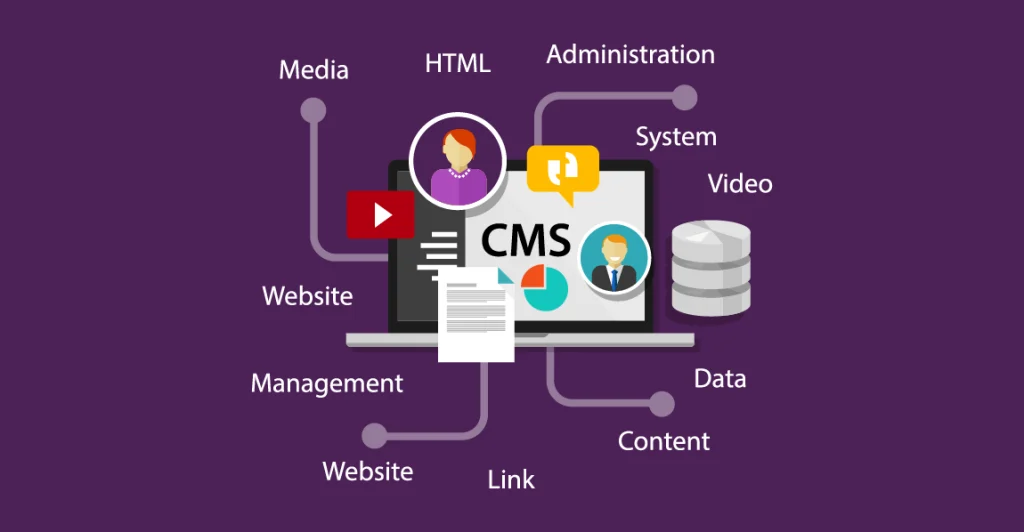In the world of creating and managing stuff on the internet, tools called Content Management Systems (CMS) are pretty important. They help us put things online in an easy way. Now, let’s talk about what’s coming up next for these tools! In this blog, we’ll look at the cool changes happening in CMS tools and what it means for us.
Headless CMS:
So, there’s this new idea called headless CMS. It’s like having separate parts for the backstage and the front stage of a show. Traditional CMS does both jobs, but headless CMS separates them. This makes it easier to change how things look on different devices and makes the whole system more flexible.
A headless CMS separates the backend content repository from the frontend presentation layer, allowing developers to deliver content across various devices and platforms using APIs.
This decoupling enables faster development cycles, easy integration with emerging technologies like voice assistants and IoT devices, and a more personalized user experience.
With the rise of headless CMS, organizations can embrace a more agile approach to content delivery, breaking free from the constraints of monolithic systems.
By adopting headless architecture, CMS developers can leverage modern front-end frameworks like React, Angular, and Vue.js to build engaging user interfaces and deliver content in real-time.

Smart Computers and Personalized Stuff:
Imagine if the computer knows what you like and shows you things you’re interested in! That’s where smart computers and personalization come in. CMS tools are getting smarter with things like AI. This means they can learn what we like and show us content that fits our interests. It’s like having a friend who always knows what movies you’ll enjoy!
Progressive Web Apps (PWAs)
Progressive Web Apps (PWAs) are web applications that offer a native app-like experience while being accessible through a web browser.
PWAs are fast, reliable, and engage users with immersive features, even in offline mode. As CMS developers strive to provide superior user experiences, PWAs will become an integral part of future CMS development.
PWAs eliminate the need for separate installations, updates, and maintenance, making them a cost-effective and user-friendly alternative to traditional mobile apps.
As a result, CMS platforms will increasingly adopt PWA technologies to deliver content seamlessly on both web and mobile platforms.
Super Safe and Shared Online Spaces:
Have you heard of blockchains? They’re like super safe and shared online spaces. In the future, CMS tools might use blockchains to keep things super secure. This helps make sure that the stuff online is safe and everyone knows who made what. It’s like having a digital superhero protecting your online things!
Talking to Computers:
You know how we talk to computers and they do things for us? It’s getting even cooler! CMS tools are going to be better at understanding when we talk to them. This is handy because more and more people are using their voice to ask the computer for things. It’s like having a friendly robot assistant that listens and does what you ask!
Apps That Feel Like Websites:
You know how some apps feel like websites? Well, CMS tools are going to help make more of these cool things called Progressive Web Apps (PWAs). They’re like super-fast websites that work even when you’re not connected to the internet. It’s like having a super speedy app without needing to go to an app store.
Working Together and Easy Buttons:
When lots of people work on something online, they need tools that help them work together easily. Future CMS tools will have better ways for people to work together on making cool stuff. There will also be more buttons that do things automatically, so you don’t have to do everything by hand. It’s like having teamwork superheroes and magic buttons!
Is WordPress Revolutionizing CMS Development?
WordPress, being the most popular content management system (CMS) globally, is at the forefront of the CMS development landscape.
With its open-source nature and vast community, WordPress continuously evolves to stay ahead of emerging trends and incorporate innovative features.
Looking into the future, we can expect WordPress to focus on enhancing user experience through intuitive interfaces, seamless integrations with emerging technologies, and improved performance.
One major trend is the rise of mobile-first design and optimization, as mobile usage continues to dominate.
WordPress will likely prioritize responsive themes, mobile-friendly plugins, and optimized performance for mobile devices.
Another significant trend shaping the CMS industry is the increasing demand for personalized and dynamic content.
WordPress is expected to further develop its capabilities in content personalization, allowing website owners to deliver tailored experiences based on user preferences, demographics, and browsing behavior. This will enable businesses to engage their audiences more effectively and drive higher conversion rates.
Furthermore, as security remains a critical concern, WordPress will continue to invest in robust security measures to protect websites from vulnerabilities and cyber threats.
This includes regular updates, stronger authentication methods, and improved user access controls.
Innovation in CMS development also means embracing emerging technologies such as artificial intelligence (AI) and voice assistants.
WordPress is likely to integrate AI-powered features like chatbots, automated content suggestions, and voice search optimization, making websites more interactive and user-friendly.
The Future of Event Management Industry in WordPress CMS
The future of the event management industry looks promising with WordPress leading the way. As the most popular content management system (CMS) globally, WordPress offers a robust platform for event professionals to streamline and enhance their operations.
Looking ahead, we can expect WordPress to introduce cutting-edge features and functionalities specifically tailored for event management.
This includes seamless event registration and ticketing systems, intuitive event calendar plugins, integrated payment gateways, and advanced attendee management tools.

With the ability to create mobile-responsive and visually stunning event websites, WordPress empowers event organizers to deliver immersive experiences to their attendees.
Furthermore, as the industry evolves, WordPress is likely to integrate emerging technologies such as AI-powered event recommendations, virtual event capabilities, and enhanced networking features.
With its flexibility, scalability, and vibrant community, WordPress is poised to shape the future of the event management industry, providing event professionals with innovative solutions to create and manage successful events.
Conclusion:
So, the future of CMS tools sounds pretty exciting, right? From separating backstage and front stage with headless CMS to having smart computers and safe online spaces, things are getting cooler. We’ll be talking to computers more, using speedy apps, and working together with easy buttons. It’s like going on a fun adventure into the future of making and sharing cool stuff online!


